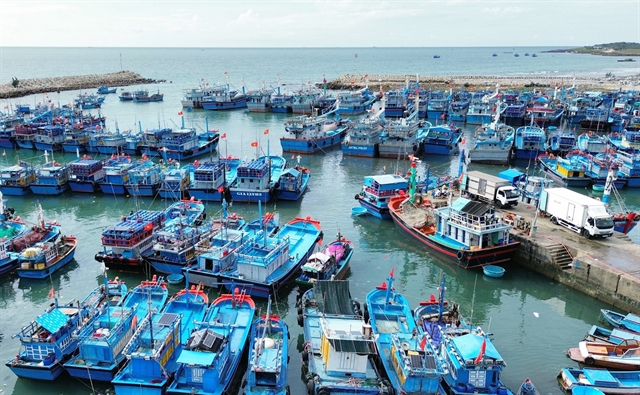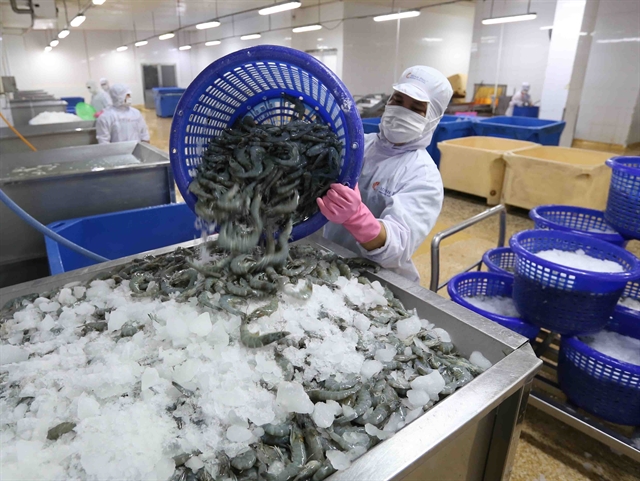.jfif) Opinion
Opinion

 |
| Nguyễn Hoài Nam, VASEP General Secretary. |
Since the European Commission issued a 'yellow card' warning on illegal, unreported and unregulated (IUU) fishing for Vietnamese export seafood products, Việt Nam’s seafood industry has faced significant challenges in maintaining export flows, ensuring traceability, and meeting strict regulatory standards.
Ahead of the EC’s upcoming inspection, Nguyễn Hoài Nam, general secretary of the Việt Nam Association of Seafood Exporters and Producers, speaks to Việt Nam News about the warning’s impact and the Government’s corrective actions, and how the country is preparing for the road ahead.
The EC has issued a 'yellow card' warning for IUU fishing for Việt Nam in 2017. How has the yellow card affected Việt Nam’s seafood export activities?
The EU’s regulations to combat IUU fishing activities took effect in 2010. Countries exporting maritime seafood products to Europe must comply with these regulations. However, in 2017, the EU issued the warning because Việt Nam's seafood products still failed to fully meet the requirements.
A yellow card is a warning, not a ban, so Vietnamese seafood can still be exported to Europe. But the EU issued recommendations that Việt Nam must implement to rectify the situation within a reasonable timeframe.
Over the past eight years, the Government and the Ministry of Agriculture and Rural Development (now the Ministry of Agriculture and Environment (MAE) have undertaken considerable work to implement these recommendations. Coastal localities have also made major efforts.
 |
| WELL-EQUIPPED: Fishing boats at Mỹ Tân fishing port, Khánh Hoà Province. Việt Nam's almost 100 per cent of over-12m vessels are now equipped with vessel monitoring systems. |
For businesses, the regulations to prevent IUU fishing activities require them to strictly control the source of raw materials, meaning traceability of inputs for seafood processing. It ensures that raw materials are not sourced from illegal fishing or prohibited activities, or even suspected violations.
As the final link in the supply chain, seafood processors must strengthen their capacity and investment to control the origin of input sources.
To export seafood to the EU, each shipment must be confirmed for the origin of the materials as not originating from IUU activities by fishing ports and the Fisheries Department. These businesses must invest more resources to ensure full legal compliance.
The raw materials must come from vessels that fish legally and maintain complete fishing logbooks. Fishing ports and the Fisheries Department must issue the Catch Certificate and Raw Material Certificates required by the EU.
But obtaining these confirmations has significantly reduced the volume of seafood eligible for EU export, which is a major challenge for many companies.
There are cases where businesses carefully verify the origin of raw materials, confirm the vessel is not on the blacklist for illegal fishing. Yet, at the final stage, when applying, they cannot receive the aforementioned certificates because authorities check vessel journey data, and find the vessel operated in non-permitted zone.
For example, a vessel over 15 meters long is only allowed to fish offshore, not nearshore, but its journey data may show it stayed in the nearshore. Such violations lead authorities to conclude the raw materials were sourced illegally, and they refuse to issue a Catch Certificate.
This is just one of many reasons why seafood processing enterprises often suffer losses in raw materials, costs and time. Some cannot even complete export orders.
Besides that, Europe continues to monitor Việt Nam regarding its efforts to combat IUU violations. If serious or repeated violations occur, the EU could issue a red card, banning Vietnamese seafood exports to this market.
Another issue is national reputation. With the yellow card, European customs inspect every Vietnamese shipment more carefully, slowing clearance. Importers, who have many other choices, may overlook Vietnamese seafood products.
Combined with limited raw material supplies due to strict IUU requirements, this has lowered Việt Nam’s export volume to the EU.
In past years, the Government and localities have implemented many corrective measures according to the EC’s recommendations. What specific results has Việt Nam achieved so far?
Việt Nam’s fishing sector began as community-based and small-scale fisheries with mostly small boats. So, the Government has issued policies to restructure the fisheries sector for sustainable marine economic development, and implemented actions under EC recommendations relating to IUU fishing. It also established a National Steering Committee on IUU Fishing Prevention and Control to deal with relevant issues.
 |
| cSTRICT: Shrimp for processing export products at Minh Phú Seafood Corporation's factory. Seafood processing factories must control the source of raw materials, according to the regulations on IUU fishing. VNA/VNS Photos |
So far, the Government has achieved significant progress in improving the legal framework, including laws, decrees, circulars, directives and unprecedented administrative sanctions related to IUU violations. This provides a more complete system that aligns with both EU recommendations and Việt Nam’s long-term goal of sustainable fisheries development.
The number of fishing vessels has reduced from over 120,000 vessels to about 83,000 vessels, as outdated vessels are retired and new vessel registrations are more strictly controlled. This helps manage fishing intensity and conserve aquatic resources.
Meanwhile, almost 100 per cent of over-12m vessels are now equipped with vessel monitoring systems (VMS) as required by regulations. There are also strict penalties for violations.
Besides that, the EU emphasises not just the number of violations handled but the quality of enforcement. Effective enforcement prevents recurring violations such as illegal incursions into foreign waters, disabling VMS devices, or fishing in the wrong zones.
Although local enforcement has been slow, directives from the Prime Minister have recently improved the situation. We hope that during the next EU inspection, these efforts will be acknowledged, paving the way for the removal of the yellow card.
What are the main challenges preventing Việt Nam from removing the yellow card?
Some vessels still commit violations. The number has fallen significantly, but the EU maintains that ongoing violations mean compliance is still inadequate.
For interruption in the operation of VMS equipment, the situation has improved recently after strong directives from the Prime Minister, but still requires strict monitoring.
Meanwhile, the number of violations actually penalised remains too low. For example, out of 10–20 violations, only a few are penalised. This weakens the deterrent effect. The EU considers strong, consistent enforcement a key criterion.
Therefore, the Prime Minister has tasked the MAE, the Ministry of Public Security, the Ministry of Foreign Affairs, and local authorities to coordinate and strictly handle violations.
How have member enterprises of the Việt Nam Association of Seafood Exporters and Producers (VASEP) contributed to Việt Nam’s efforts to combat IUU fishing?
Seafood processing enterprises play a crucial role as they handle the final stages of purchasing, processing and exporting seafood.
Immediately after receiving the yellow card in 2017, VASEP held a meeting with more than 60 exporting members and proposed concrete actions to implement the EU's IUU regulations. They have maintained strict compliance with IUU rules for both domestic and imported raw materials used for EU-bound products.
Each member has pledged not to purchase, process or export any products linked to IUU fishing. The list of committed enterprises is publicly posted on VASEP’s website.
Meanwhile, VASEP has worked regularly with the Department of Fisheries and Fisheries Surveillance under the MAE (formerly the Directorate of Fisheries) to amend and build legal frameworks.
The association has also participated in the National IUU Steering Committee to report to the Government challenges in combating IUU fishing based on real-world observations, and, to communicate policies related to this issue to fishermen and businesses.
Besides that, VASEP has informed partners in Europe, the US, Japan, and other markets about Việt Nam’s commitments to sustainable development. So far, no VASEP member enterprise has been found violating IUU regulations.
How is the seafood industry preparing for the EC's inspection in the coming time?
Việt Nam’s best preparation is to effectively address as many issues as possible under the EU recommendations. If the inspection team sees real and positive changes in fishing vessel management and enforcement quality, that is the strongest argument for lifting the yellow card.
In addition, the industry needs to have complete data on vessel journey monitoring, records of issued certificates and other documentation for the inspection team. VNS




